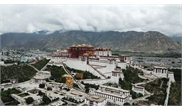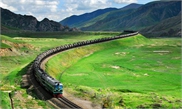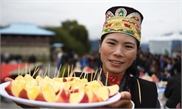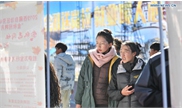IN-DEPTH / IN-DEPTH
Selection of Dalai successor must follow central government: experts

A woman prays in front of the Potala Palace in Lhasa on August 27, 2018. Photo: VCG
The Dalai Lama clique has once again expressed their wish to control the senior monk's succession.
At a conference in Dharamsala, India this week, it was suggested the Dalai Lama should pick his successor, otherwise "Tibetans" wouldn't recognize the pick.
Such demands from the Dalai clique are cliché. Dalai and the Western powers that support him frequently comment and try to interfere with the succession issue.
As the Dalai Lama gets older, his clique has shown the sense of urgency to maintain their influence, Zhu Weiqun, former head of the Ethnic and Religious Affairs Committee of the National Committee of the Chinese People's Political Consultative Conference, to the Global Times.
Given the international backdrop of the US implementing its strategy against China, including the ongoing events in Hong Kong, Western media will try to use Tibet to exaggerate the situation. The Dalai clique will borrow from the current situation to boost confidence, Zhu noted.
Sam Brownback, the US ambassador for international religious freedom, met with the Dalai Lama last month in India. Brownback called China's legal rights on the reincarnation "meritless" while praising India's support of the Dalai clique.
Tibetan Buddhists living overseas convened last month to pass a resolution, "vesting the rights to choose a successor on the Dalai Lama himself," Nikkei Asian Review reported.
"Tibetans say the Dalai Lama should choose his successor," an Associated Press report said on Wednesday.
Zhu noted that the so-called "Tibetans" in the Dalai clique represent the interests of a deposed reactionary upper class and former slave owners who revolted against land reform.
The clique has proclaimed themselves to be the "Tibetan People" or "legal Tibetan government," despite failing to gain legitimacy among Tibetans.
Those who support the Dalai Lama have turned a blind eye to Tibet's development, demonstrating a clear "double standard."
The Tibet Autonomous Region in Southwest China has benefited from stable development for decades under the leadership of the central government. In contrast, the Dalai Lama's followers rioted on March 14, 2008 in Lhasa to undermine the 2008 Beijing Olympic Games at the expense of Tibet's stability and prosperity.
In China's history, clear rules had been established concerning the reincarnation of Living Buddhas. Their reincarnation comes with set rituals and conventions, China's Ministry of Foreign affairs has reaffirmed many times.
The 14th Dalai Lama was appointed and recognized following religious rituals and historical conventions, and his succession was approved by the central government.
Reality cannot be adjusted according to Western strategies that aim to divide China or function as a mouthpiece an for older society, as the Dalai Lama has done for the past five decades, Zhu said.
Some are predicting there will be a contest on the reincarnation issue for which the central government is confident and prepared. The reincarnation issue has never been a purely religious affair or Dalai Lama's personal affair. It is a significant political event for Tibet, showing the central government's sovereignty over the autonomous region.
The Dalai clique and those who attempt to contain China through the Dalai Lama should cease reactionary destabilization efforts, which would provide them with an opportunity for a lenient conclusion.




